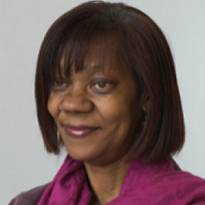Dr Jenny Douglas

Jenny Douglas is a Senior Lecturer in Health Promotion in the Faculty of Wellbeing, Education and Language Studies at the Open University. Jenny’s research has concentrated on changing policy, practice and approaches to research in health promotion and public health. She has published widely on public health, health promotion and black women’s health. The key theme unifying her research and activism is intersectionality – exploring how ‘race’, class and gender affect health. Jenny Douglas established and chairs the Black Women’s Health and Wellbeing Research Network.
More about me...
Dr Jenny Douglas explains why deaths appeared to be greater among people from minority ethnic and religious groups.
Dr Jenny Douglas explains why deaths appeared to be greater among people from minority ethnic and religious groups.
There is evidence from public reports that a higher proportion of people from ethnic minority communities have died.
There are a number of reasons why this is the case.
- Long standing social inequalities mean that people from ethnic minorities are more likely to be in jobs which expose them to the virus, such as working in health and social care or transport.
- Racism is still a big problem in the UK, and this has an impact on health. People from ethnic minority communities have worse overall health than the white majority, which means that more people were living with other illnesses which contributed to them having a worse experience of covid.
Another issue is that there is a historic mistrust of healthcare systems. Many years of structural racism have contributed to worse healthcare experiences for people from ethnic minorities. Sadly, there have been a number of times in recent memory when people from ethnic minorities have been actively mistreated by health care institutions, particularly around the development of new treatments. This meant that some people were scared to seek help from hospitals at points during the pandemic.
These factors taken together start to explain why more people from ethnic minorities were worse affected by covid.
Dr Jenny Douglas talks about the use of language to describe race across this website.
Dr Jenny Douglas talks about the use of language to describe race across this website.
In this module we use the term ‘ethnic minority communities’ to describe people from Black, Asian and other minority ethnic groups who participated in this research. Identity is complex, and there are many ways to talk about race and ethnicity in the UK. Some people we spoke to used their own identifier, such as Black, Indian, or African. Other people used terms like BME, which stands for Black and minority ethnic, or BAME, which means Black Asian and minority ethnic. People sometimes referred to their main identity as relating to their religion, such as Jewish or Muslim.
There is criticism of the term ‘minority’, because it does not reflect the history of race in the UK and its connection to colonial legacies. Sometimes people prefer to use the term ‘minoritised’, for example. We use minority for purposes of accessibility, but recognise its limitations.

